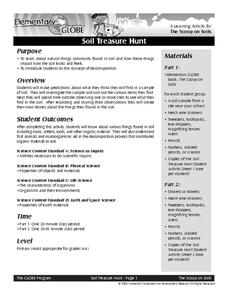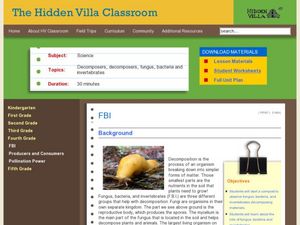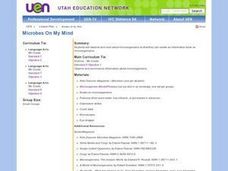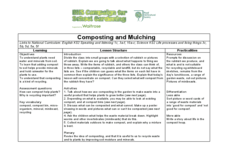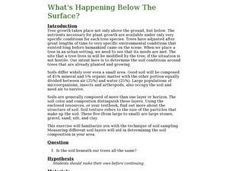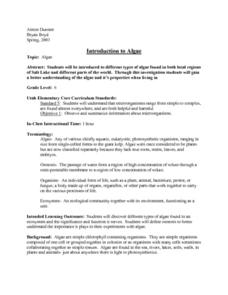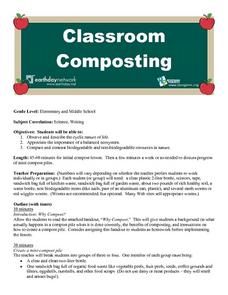Curated OER
Soil Treasure Hunt
Learners explore the concept of soil and decomposition. In this soil and decomposition lesson, students investigate bags of soil. Learners then learn how animals and other organisms help in the decomposition process.
Curated OER
Microorganisms: Good Guys or Bad Guys?
Students discover the role microorganisms play in our lives. In this decomposition lesson, students examine decaying foods and plants in order to analyze the different bacteria that grows. Students discuss the good and bad of...
Curated OER
Optional Laboratory: Comparing Soil Temperatures In Sun and Shade
Students work together to test the temperatures of different soils in shade and sun. They make their own hypothesis before beginning the experiment. They record their data and discuss as a class.
Curated OER
Optional Laboratory: Soil Particle Size and Texture
Students work together to perform experiments on different types of soil. They record the soil's pH level, color and texture. They develop hypothesis' on what they believe they will discover before beginning the experiment.
Curated OER
FBI
Fourth graders experiment with compost. In this Science lesson, 4th graders begin a worm compost as well as an outdoor compost. Students discuss decomposition.
Curated OER
Microbes on My Mind
Students observe and read about microorganisms so that they can create an information book on microorganisms.
Curated OER
Composting and Mulching
Second graders define composting and recognize what can be composted. For this composting and mulching lesson, 2nd graders classify objects or pictures as good or bad for composting. Students write a story about life in the compost heap.
Curated OER
Water Filtration
As an example of nature's water filtering system, young ecologists conduct an experiment in the lab. They construct a funnel out of a plastic bottle, fill it with specified layers of materials that simulate layers of soil, then run muddy...
Curated OER
Spud Smear
Learners study various samples of microorganisms in petri dishes. In this microorganism lesson, students place various samples of items in petri dishes and observe them after several days of incubation.
Curated OER
What's Happening Below The Surface?
Students determine the soil composition of soil layers in their area. They collect soil samples, calculate the percentage soil water content, analyze data, and evaluate each site for future tree growth.
Curated OER
Winogradsky in a Bottle: Beginning a Winogradsky Column
Students use their measurement skills by marking a bottle for construction purposes. They record qualitative and quantitative data and analyze their results. Students demonstrate evaluation of a small scale systems as a model for the...
Curated OER
Reading the River
In collaborative groups, young ecologists measure the temperature, pH, and dissolved oxygen for three different freshwater samples. They examine each sample with a microscope and record observations on the microorganisms in the pond...
Curated OER
Discovery Science Center Activities
Fourth graders complete a variety of experiments to meet science goals. In this life sciences lesson, 4th graders make yogurt, discover the attraction of opposite charges in electricity, learn the effects of glaciers, and explore...
Curated OER
Organic and Inorganic Waste
Learners conduct a scientific investigation about organic or inorganic waste. In this organic or inorganic waste activity, students create a compost heap to determine the difference between inorganic and organic waste. Learners record...
Curated OER
Build an Outdoor Compost Heap
Learners study how to create a compost heap. In this composting lesson, students create a compost heap. Learners write an essay describing the process.
Curated OER
Dependence and Interdependence
Third graders explore the dependence and interdependence that plants and animals in every environment have on one another. They examine how plants and animals depend on each other for survival. Students complete a variety of experiments...
Curated OER
Buried Treasure
Students examine the role of micro and macro organisms in the decomposition process. They record their observations and discuss. They also read a book about decomposition.
Curated OER
Introduction to Algae
Students explore different types of algae found in both local regions of Salt Lake and different parts of the world. They discover different types of algae found in an ecosystem and the significance and function it serves.
Curated OER
Nature's Recycling Program
Students identify what materials make up compost. In this science of recycling lesson, students explain the benefits of composting determine how compost is a good plant fertilizer.
Curated OER
Biodegradability
Students study the effects of water, salt water and heat on common household materials. They separate an emulsion and show that the materials are completely recoverable and observe the effect of acetone and water on polystyrene.
Curated OER
Compost in a Bag!
Fourth graders experiment to see which objects decompose. For this compost lesson, 4th graders observe the changes of labeled objects in a bag. Leave the objects for one month and record the changes by observation and weight. Students...
Curated OER
Classroom Composting
Pupils discover the benefits of composting. They identify the steps of decomposition as well. They are read a book and discuss what items decompose.
Curated OER
THE FARMER CARES FOR THE LAND
Students will identify cause and effect relationships in issues relating to Agriculture and the environment.Ask students to describe what farmers do. Then ask students to define the word "environmentalist." Ask students if they have...
Curated OER
Disposable vs. Reusable, Biodegradable vs. Non-biodegradable
Students examine and identify biodegradable and non-biodegradable materials. They discover ways in which biodegradable materials can help minimize pollution.


